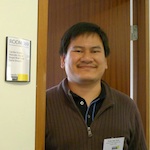by Rogel Mari Sese
- Published: Monday, April 22 2013 06:00
Astronomy education plays a very crucial role, not just in promoting astronomy but also in improving the science literacy of a society. Most developing countries have lagged behind, not just in terms of astronomy awareness and education, but also in terms of economic status and basic human needs. In fact, education can be seen as a tool to break the cycle of poverty and improve living conditions. In countries such as the Philippines, education usually gets a small percentage of the national budget, leading to lack of teachers and infrastructure.
One of the biggest, and understated, role of astronomy is to serve as a gateway to the different sciences such as physics, chemistry and biology. By leveraging on everyone’s childhood fascination with the celestial sky and desire to become an astronaut, astronomy can encourage more children to become interested in the science, technology, engineering and mathematics (the STEM areas). This role of astronomy is evidenced in the decadal plan of the International Astronomical Union (IAU) and programs such as Universe Awareness (UNAWE) and Galileo Teacher Training Program (GTTP). These programs promote astronomy by teaching both the students and the educators at the same time to be more sustainable and effective. When I teach astronomy to the young ones (as well as the young once), I always see a lot of hands in the air when I ask who are interested in the stars. Hence, it is vital that this interest is sustained throughout a child’s development from kindergarten to college level. Sadly, a lot of these dreams remain unrealized and unfulfilled mainly due to the absence of astronomy in the school curriculum.
In recent years, the Philippines has been improving in terms of its astronomy education and public awareness. The government is starting to realize the value of astronomy as an means to develop the educational system and space science as a means to develop the economy. One thing we realized is that it is impossible to develop a one-size-fits-all kind of curriculum for astronomy and space science. Each school has their own capabilities and weaknesses and we cannot impose a school to have a telescope when a basic computer is lacking (or in some cases, even electricity). Thus, we developed a three-pronged approach to astronomy and space science education: a Back-to-Basics Approach where students are taught about the moon, stars and planets using locally and easily available materials; an ICT Approach, which utilizes computers, planetarium software and the Internet to expand the student’s knowledge on astronomy and; a Technology Approach where students can get a hands-on experience of observing moon craters, astrophotography and even solar spectroscopy. Each approach will be tailor-fitted to the capabilities of the school and the students to increase its effectiveness.
This year, we look forward to implementing for the first time in the Philippines a pilot program in space science education for all year levels from 1st to 12th grade. Although there are a lot of challenges that needs to be addressed, the program will hopefully increase the knowledge of Filipino students in astronomy and space science. Of course, we are not expecting everyone to become an astronomer. Having a few students change their mind and go into the sciences is already a small, and at the same time big, step in improving the science literacy of a country. Depending on the effectivity, we hope that similar programs can be implemented in the future in different schools throughout the country. Then, astronomy would have fulfilled its role in opening up new horizons that were never even imagined. And all of this because a child looked up into the night sky and saw the light at the end of the telescope and realized that the Universe is indeed vast, amazing and awe-inspiring.
###
 Rogel Mari Sese, also known as Rogel or Romar, was born and raised in Los Baños, a university town 60 km south of Manila, Philippines. Having been exposed to an academic environment at a young age, he learned a lot about science from his parents and the surrounding community. After earning his Bachelors degree in his hometown, Rogel spent several years teaching at the university, whilst pursuing his Masters degree in Manila. He then obtained his doctorate at the University of Tsukuba in Japan, specializing in computational astrophysics. As one of the few Filipino astrophysicists, he always keenly encourages people to pursue careers in astronomy and astrophysics. He recently returned to the Philippines with the dream of developing astronomy and space science in the country through education, research, collaborations and public outreach. Rogel is currently teaching at the University of the Philippines Los Baños, Focal Person for the Philippine Space Science Education Program and Chair of the Southeast Asian Young Astronomers Collaboration.
Rogel Mari Sese, also known as Rogel or Romar, was born and raised in Los Baños, a university town 60 km south of Manila, Philippines. Having been exposed to an academic environment at a young age, he learned a lot about science from his parents and the surrounding community. After earning his Bachelors degree in his hometown, Rogel spent several years teaching at the university, whilst pursuing his Masters degree in Manila. He then obtained his doctorate at the University of Tsukuba in Japan, specializing in computational astrophysics. As one of the few Filipino astrophysicists, he always keenly encourages people to pursue careers in astronomy and astrophysics. He recently returned to the Philippines with the dream of developing astronomy and space science in the country through education, research, collaborations and public outreach. Rogel is currently teaching at the University of the Philippines Los Baños, Focal Person for the Philippine Space Science Education Program and Chair of the Southeast Asian Young Astronomers Collaboration.








Comments